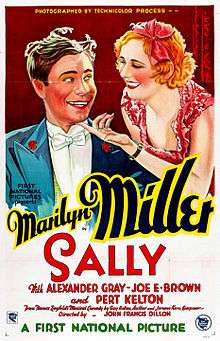Sally (1929 film)
| Sally | |
|---|---|
 theatrical release poster | |
| Directed by | John Francis Dillon |
| Written by |
Waldemar Young A.P. Younger based on the Broadway musical by Guy Bolton and P.G. Wodehouse |
| Starring |
Marilyn Miller Alexander Gray Joe E. Brown Pert Kelton |
| Music by |
Jerome Kern Leonid S. Leonardi Irving Berlin Al Dubin Joe Burke |
| Cinematography |
Devereaux Jennings Charles Edgar Schoenbaum (Technicolor) |
| Edited by | LeRoy Stone |
Production company | |
| Distributed by | First National Pictures |
Release dates |
|
Running time | 103 minutes |
| Country | United States |
| Language | English |
Sally is a 1929 American Pre-Code film. It is the fourth all talking all-color feature movie ever made and was photographed in the Technicolor process. It was the sixth feature movie to contain color that had been released by Warner Bros., the first five were The Desert Song (1929), On with the Show (1929), Gold Diggers of Broadway (1929), Paris (1929), and The Show of Shows (1929). (Song of the West was actually completed by June 1929 but had its release delayed until March 1930). Although exhibited in a few select theatres in December 1929, Sally only went into general release on January 12, 1930.
It was based on the Broadway stage hit, Sally, produced by Florenz Ziegfeld (which played at The New Amsterdam Theatre, from December 21, 1920 to April 22, 1922), and retains three of the stage production's Jerome Kern songs ("Look for the Silver Lining", "Sally", and "Wild Rose"), the rest of the music newly written for the film by Al Dubin and Joe Burke.[1]
Marilyn Miller, who had played the leading part in the Broadway production, was hired by the Warner Brothers at an extravagant sum (reportedly $1000 an hour for a total of $100,000) to star in the filmed version.[2] The film was nominated for an Academy Award for Best Art Direction by Jack Okey in 1930.[3][4]
Plot
Sally (Marilyn Miller) plays the part of an orphan who had been abandoned as a baby at the Bowling Green telephone exchange. While growing up in an orphanage, she discovered the joy of dancing. In an attempt to save money enough to become a dancer, Sally began working at odd jobs. While working as a waitress, a man named Blair (Alexander Gray) begins coming to her work regularly to see her. They both soon fall for each other.
Sally, however, does not know that Blair has been forced into an engagement by his family with a socialite named Marcia (Nora Lane). One day, a theatrical agent shows up at Sally's work (T. Roy Barnes) and gives her a chance to audition for a job. Sally, however, ends up losing her job and the opportunity when she drops a tray of food into Barnes' lap. Eventually, Sally gets another job at the Elm Tree Inn, which is managed by Ford Sterling. Blair drops in one day and immediately takes an interest in Sally. He convinces Sterling to have Sally dance for his customers. While she is performing one day, the theatrical agent (T. Roy Barnes) notices her and convinces Sally to impersonate a famous Russian dancer named Noskerova at a party being given by Maude Turner Gordon. At that engagement, she is found to be an imposter and is asked to leave. Before Sally leaves, however, she hears the announcement of Blair's engagement to Marcia. Undaunted, she proceeds with her life and eventually becomes a star on Broadway. Unfortunately she never forgets Blair and becomes terribly depressed until...
Preservation
While never technically a "lost" film, Sally was unavailable for public viewing for nearly six decades. Warner sold filmography pre-1950 to AAP/UA,[5] or destroyed nitrate copy this films in end 1940s and 1950s. It was not until around 1990 when the film was once again available for archival and revival screenings. However, the film survives only in black and white except for a 21⁄2-minute color segment from the Wild Rose musical number, which was discovered in the 1990s and inserted into the print currently in circulation. Sepia-toned black-and-white footage is inserted to replace individual frames which are missing in the color fragment.
Cast
- Marilyn Miller as Sally
- Alexander Gray as Blair Farrell
- Joe E. Brown as Grand Duke Constantine
- T. Roy Barnes as Otis Hemingway Hooper
- Pert Kelton as Rosie, Otis' girlfriend
- Ford Sterling as 'Pops' Shendorff
- Maude Turner Gordon as Mrs. Ten Brock
- E. J. Ratcliffe as John Farquar
- Jack Duffy as The Old Roue
- Nora Lane as Marcia
See also
References
- ↑ Bradley, Edwin M. (1996). The First Hollywood Musicals: A Critical Filmography of 171 Features, 1927 Through 1932. McFarland & Company. pp. 87–90.
- ↑ Photoplay, September 1929
- ↑ "NY Times: Sally". NY Times. Retrieved 2008-12-07.
- ↑ Sally at silentera.com
- ↑ 1957 MOVIES FROM AAP Warner Bros Features & Cartoons SALES BOOK DIRECTED AT TV
External links
- Sally at the Internet Movie Database
- Sally synopsis, allmovie.com
| ||||||||||||||